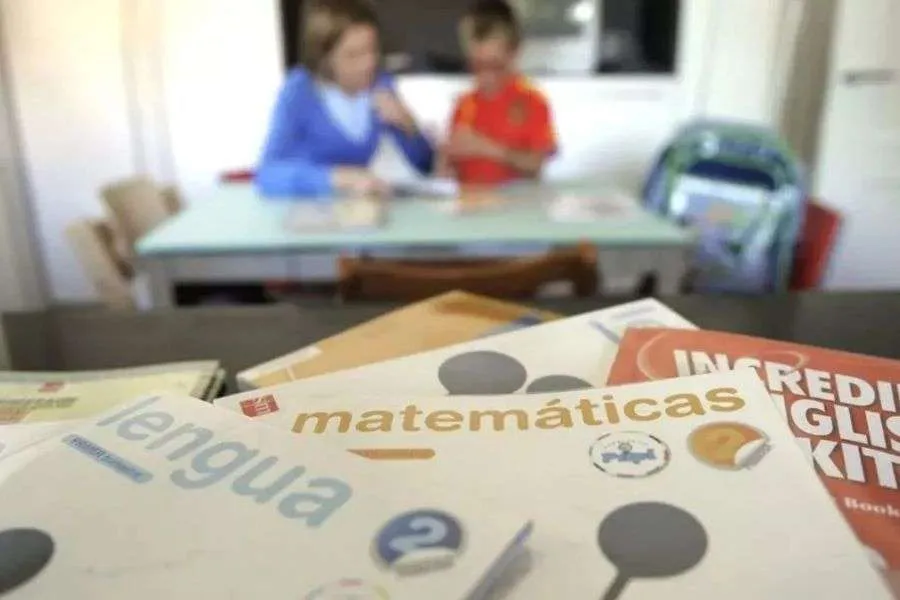Free school books for Canary Islands pupils from 2026
- 05-11-2025
- National
- Canarian Weekly
- Photo Credit: NACHO GALLEGO-EFE
The Canary Islands Government has announced its 2026 budget for Education, Vocational Training, Physical Activity, and Sports, totalling €2.315 billion, a 7.4% increase on last year. With €159 million more than in 2025, it represents the largest education budget in the history of the islands.
One of the most anticipated measures is the introduction of free school books and materials, which will be rolled out gradually from the 2026–27 academic year across all compulsory education stages.
The programme will begin with an initial investment of €11 million and aims to create a public bank of books and educational materials to guarantee equal access for all students in the Canary Islands. In its first phase, it will benefit more than 70,000 pupils in the early years of Primary, ESO (secondary), and Basic Vocational Training, eventually reaching around 185,000 students once fully implemented.
The funding per pupil will range from €120 to €220, depending on the level of education, with materials designed to be reused over four or five school years.
Councillor Suárez said the initiative represents “a major step towards a more inclusive and affordable education system,” easing the financial burden on families and promoting social equality. The government is also studying the possibility of extending the scheme to include the final stage of pre-school education.
Education accounts for 18.5% of the Canary Islands’ total budget, making it the second-largest area of public spending after health. Among the main measures for 2026 is the recruitment of almost 1,000 new teachers and the gradual reduction of class sizes, following an agreement reached with teachers’ unions last year.
The plan aims to reduce class sizes to a maximum of 16 to 20 pupils in Infant Education, 22 in Primary, and 25 in Secondary, positioning the Canary Islands among the regions with the best student-to-teacher ratios in Spain.
The budget will also increase support for students with special educational needs, with 1,614 non-teaching assistants now working in schools, which is an increase of 59% since 2022. The number of guidance and therapeutic teachers has also risen to 2,941, and the islands have opened 72 new specialist classrooms, three special education centres, and seven TEA (autism support) units, with more in planning.
A further €22 million will be invested to continue expanding free early childhood education for children aged 0 to 3 years, now funded entirely from the regional budget following the end of European grants. There are currently 2,700 public nursery places, 2,200 of which have been created during this term, and the target is to reach 3,879 by 2026.
The childcare voucher scheme will rise to €5 million, with higher income thresholds so more families can benefit. Meanwhile, funding for school transport will increase by €8 million, and an additional €2.8 million will go towards canteen and breakfast programmes.
In terms of infrastructure, the government will continue its Strategic Plan for Educational Infrastructure 2024–2035, with a total of €235 million, and the €85 million South Tenerife Action Plan, which focuses on building and expanding schools. A further €30 million will go to the High Temperature Adaptation Plan, which includes solar panels for 56 schools, shaded areas for 160 centres, and new protocols for heatwaves. The School Naturalisation Project will also move forward, transforming schoolyards into greener, more sustainable spaces.
Vocational Training (FP) continues to grow strongly, with the number of training groups increasing from 2,342 to 2,600 in just two years, and enrolment rising from 42,788 to 47,000 students. The FP teaching staff now totals 4,000, nearly 300 more than two years ago, supported by 30 industry coordinators who work to strengthen partnerships between training centres and businesses. An extra €2 million in grants will also be allocated to this sector to help link students’ skills with the job market.
The education department is also modernising its administration with a new Simplification Plan covering 65 measures to reduce bureaucracy in schools. The new Doramas management system will cut internal procedures by up to 50%, allowing school leaders to focus more on teaching and student support.
“Responsible management means using every euro effectively,” said Councillor Suárez. “This budget is a commitment to equity, quality, and the well-being of the entire educational community in the Canary Islands.”
Other articles that may interest you...
Trending
Most Read Articles
Featured Videos
TributoFest: Michael Buble promo 14.02.2026
- 30-01-2026
TEAs 2025 Highlights
- 17-11-2025



























































